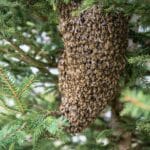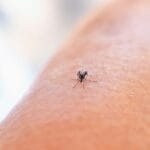Keeping our homes free from pests is important, but not at the expense of the health and well-being of our loved ones and pets. That’s why eco-friendly pest control is not just a trend; it’s a commitment to a healthier lifestyle and a harmonious relationship with nature. Let’s take a closer look at how we can deal with pests without using harsh chemicals.
Main Points
- Eco-friendly pest control is beneficial for your health and the environment.
- It’s important to know what pests you’re dealing with to choose the right natural remedies.
- Simple, homemade solutions can work wonders on pests.
- Professional eco-friendly services provide safe, specialized treatments.
- Prevention is the best way to keep your home pest-free.
Learn About Safe Pest Control Methods
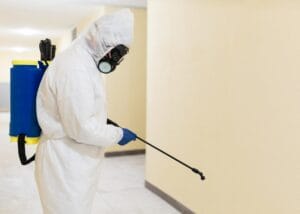
I bet you want to protect your home from pesky pests, but you’re also aware of your impact on the environment. The great thing is, there are many methods that are both safe and effective. Whether you have ants in the kitchen or aphids in the garden, nature has an answer.
Why You Should Opt for Eco-Friendly Pest Control
First and foremost, eco-friendly pest control prioritizes safety. Conventional pesticides frequently contain chemicals that are detrimental to humans, pets, and the environment. By opting for natural methods, you’re not only ensuring the safety of your family but also contributing to the protection of wildlife and the preservation of the ecological balance. In addition, these methods are often more economical and offer long-lasting solutions by tackling the source of the problem rather than just the symptoms.
Recognizing Your Pest Issue
Before you can deal with the issue, you need to identify the perpetrators. Different pests have different vulnerabilities, and there’s no universal solution. Examine the damage patterns, droppings, or the pests themselves more closely. Once you’ve identified the problem, you can select the most effective natural deterrents and strategies specifically designed for your uninvited visitors.
The content provided is an empty HTML tag. There is no AI content to rewrite.
DIY Pest Control: Easy Actions You Can Do

Let’s get down to business and delve into the world of eco-friendly pest control with some homemade strategies. The great thing about DIY methods is that they often involve ingredients you already have in your kitchen or can easily get. Plus, they’re enjoyable to create and use!
Deterring Pests with Natural Ingredients
Nature is teeming with ingredients that pests despise but are safe for us and our pets. Peppermint oil, for instance, smells invigorating and repels ants and spiders. Meanwhile, citrus peels can keep cats away from your garden without hurting them. Here are a few natural repellents you can use:
- Essential oils: Consider using peppermint, citronella, and tea tree oils to keep bugs away.
- Herbs: Planting herbs like basil, lavender, and rosemary can help keep mosquitoes and flies from bothering you.
- Spices: Using spices like cinnamon, cloves, and cayenne pepper can help deter many types of bugs.
Homemade Bug Sprays and Traps
Moving on to homemade solutions, you can make effective bug sprays and traps with just a few things you probably already have around the house. A simple mixture of water and dish soap sprayed on your plants can keep aphids from infesting them. To trap fruit flies, you can use a container with apple cider vinegar and a drop of dish soap. And for moths, a sachet filled with dried lavender can help protect your clothes.
Here’s a simple formula for a versatile eco-friendly pest spray:
Combine 1 tablespoon of liquid dish soap with 1 gallon of water. For an added punch, include a few drops of peppermint oil. Spray this mixture on the areas in question, but make sure to test it on a small patch first to avoid potential damage to plants or surfaces.
Professional Assistance Without the Chemicals
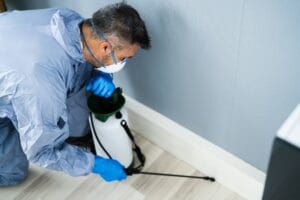
There are situations when an infestation requires professional intervention. However, you don’t have to sacrifice your eco-friendly values. There are pest control businesses that focus on natural methods.
These experts apply techniques that are harmless in both interior and exterior settings, concentrating on enduring deterrence. They appreciate the significance of preserving the ecological equilibrium while ensuring your residence is devoid of pests.
What to Consider When Searching for Eco-Friendly Pest Control Services
When you’re on the hunt for a pest control service, honesty is a must. You should go for a company that is forthright about their techniques and products. Here’s what you should look for in a service:
- Natural, biodegradable solutions
- Child and pet-friendly, non-toxic techniques
These characteristics demonstrate that the service is genuinely green and devoted to eco-friendly methods.
What to Ask Your Pest Control Specialist
Before you hire a professional, make sure you’re informed. Here are some questions you might want to ask:
- What sort of products will you be using?
- What measures do you take to protect my family and pets?
- Could you explain your pest management strategy to me?
These questions will help you determine whether their principles match yours and whether they are suitable for your requirements.
Keep Pests at Bay: Prevention is Better Than Cure

The best way to deal with pests is to prevent them from entering your home in the first place. A clean home, sealed entryways, and well-maintained outdoor spaces can deter pests and prevent infestations from occurring.
Keeping Your Home Clean and Sealed
One of the best ways to prevent pests is by keeping your home clean. Pests are drawn to sources of food and water, so it’s important to clean up spills, store food in sealed containers, and repair any leaks. You should also seal any cracks or openings where pests could get in, and you might want to think about using door sweeps for extra protection.
Advice for Gardens and Outdoors
Your garden can be a safe haven for pests or a fortress against them, depending on how you manage it. Invite natural predators such as ladybugs and praying mantises into your garden to eat the insects that can harm your plants. Be smart about using mulch, as it can hide pests if it’s too close to your house. Don’t forget to trim back any trees and shrubs that could give pests a way in.
To wrap up, green pest control is all about finding equilibrium. It’s about making educated decisions and taking proactive steps that are in line with the health of our families, pets, and the world. With these pointers and tactics, you’re ready to handle pests in an eco-friendly manner.
Maintaining a pest-free home while ensuring the safety of our family and pets is a top priority. This is where eco-friendly pest control comes in. It’s not just a trendy phrase; it’s a pledge to protect health and balance with nature. So, let’s look at how we can deal with pests without using harsh chemicals.
Key Points
- Eco-friendly pest control is good for your health and the planet.
- It’s important to know what pests you’re dealing with to choose the right natural remedies.
- Simple, homemade remedies can be surprisingly effective at controlling pests.
- Professional eco-friendly services can provide safe, specialized treatments.
- Prevention is key to keeping your home pest-free.
Learn About Safe Pest Control Options
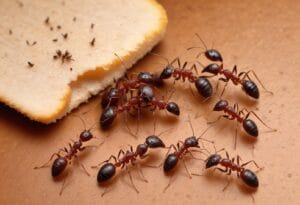
You’re probably interested in protecting your home from pests, but you also want to be mindful of your impact on the environment. Luckily, there are many options that are both safe and effective. Whether you’re dealing with ants in your kitchen or aphids in your garden, nature has a solution for you. Discover more about effective natural pest control and how you can implement these methods in your own space.
The Benefits of Eco-Friendly Pest Control
The main advantage of eco-friendly pest control is that it prioritizes safety. Conventional pesticides often have ingredients that can be dangerous to humans, pets, and the environment. By opting for natural methods, you’re not just protecting your family, but also wildlife and the ecological balance. On top of that, these methods are often cost-effective and offer long-term solutions by tackling the source of the problem rather than just the symptoms.
Recognizing the Pests in Your Home
The first step to solving your pest problem is understanding what you’re up against. Each type of pest has unique vulnerabilities, so there isn’t a one-size-fits-all solution. You’ll need to examine the damage, droppings, or the pests themselves to identify them. Once you know what you’re dealing with, you can select the best natural deterrents and tactics for your specific pests.
Homemade Pest Control: Simple and Easy Tactics

It’s time to get our hands dirty and dive into the world of eco-friendly pest control with some homemade methods. The best part about these DIY tactics is that they often use items you already have in your kitchen or can easily get. Plus, they’re enjoyable to create and use!
Nature’s Pest Repellents
Nature is a treasure trove of substances that pests can’t tolerate but are safe for us and our pets. For instance, the scent of peppermint oil not only invigorates our senses but also keeps ants and spiders at bay. Meanwhile, citrus peels can keep cats away from your garden without causing them any harm. Here are a few natural deterrents you can try:
- Essential oils: Insects hate the smell of peppermint, citronella, and tea tree oils.
- Herbs: Plant basil, lavender, and rosemary in your garden to keep mosquitoes and flies away.
- Spices: Cinnamon, cloves, and cayenne pepper can keep many types of insects away.
DIY Repellents and Traps
Next, let’s talk about DIY solutions. You can make effective repellents and traps with a few things you probably already have in your home. Spray a mixture of water and dish soap on your plants to keep aphids away. To trap fruit flies, fill a container with apple cider vinegar and add a drop of dish soap. And to keep moths away from your clothes, make a sachet filled with dried lavender.
Combine 1 tablespoon of liquid dish soap with 1 gallon of water. If you want to give it a bit more punch, add a few drops of peppermint oil. Spray this mixture on the problem areas, but make sure to test it on a small patch first to avoid potentially harming plants or surfaces.
Get Professional Help Without Using Toxins

Sometimes an infestation is so bad that you need to call in the professionals. But don’t worry, you don’t have to give up your eco-friendly ways. There are pest control companies that focus on natural methods.
They employ methods that are safe for both inside and outside settings, with an emphasis on long-term prevention. These experts realize the significance of preserving the ecological equilibrium while also keeping your home free of pests.
How to Choose an Eco-Friendly Pest Control Service
If you’re in the market for a pest control service, honesty is crucial. It’s important to find a service that is upfront about the methods and products they use. Here are some things you should look for:
- Environmentally-friendly treatments that are biodegradable and organic
- Safe, non-toxic methods that won’t harm your kids or pets
- Use of Integrated Pest Management (IPM) techniques
These are the key features that make a pest control service genuinely green and dedicated to sustainable methods.
What to Ask Pest Control Experts
Before you engage a company, be sure you’re informed. Ask questions such as:
- What products do you typically use?
- What steps do you take to protect my family and pets?
- Can you explain your pest control process?
These questions will help you determine if their methods and values match yours and if they’re the best choice for you.
Preventive Steps: Ensuring Pests Stay Out
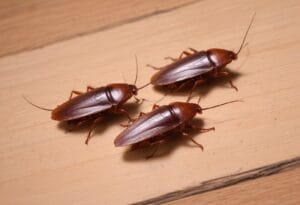
It’s always better to stop something from happening in the first place than to repair the damage after it has happened. This is especially true with pests. By making your home less attractive to pests, you can prevent infestations before they occur. This includes regular cleaning, sealing up entry points, and taking care of outdoor spaces.
Keeping a Tidy and Secure Home
The first step to pest control is keeping your home clean. Pests are drawn to food and water, so clean surfaces regularly, keep food in sealed containers, and repair any leaks. Close any gaps or holes where pests might get in, and think about using door sweeps for extra protection.
Advice for Your Yard and Garden
Your garden can either be a paradise for pests or a fortress against them. Attract natural predators such as ladybugs and praying mantises that devour harmful bugs. Be careful with mulch, as it can be a breeding ground for pests if it’s too close to your house. Don’t forget to cut back trees and bushes that could provide a pathway for pests to get inside. For more tips on keeping your home pest-free, check out our spring pest-proofing guide.
Eco-Friendly Pest Control: Safe Methods for Your Family and Pets


